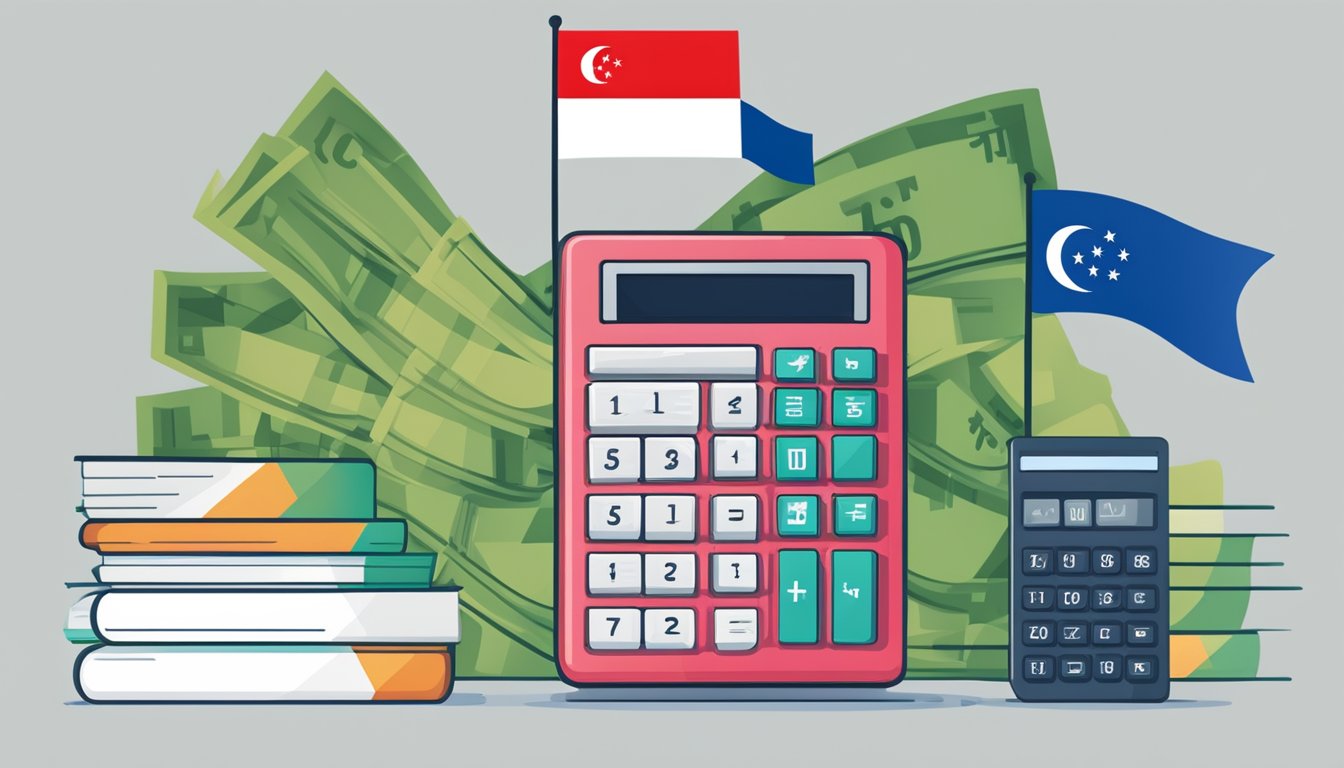If you’re looking to take out a loan in Singapore, you’ll need to know how much you’re eligible to borrow. There are a variety of factors that lenders will take into account when assessing your eligibility, including your income, credit score, and existing debts. Understanding these factors can help you determine how much you can realistically borrow, as well as what type of loan might be best suited to your needs.

One of the key factors that lenders will look at when assessing your eligibility for a loan is your income. Generally speaking, the more you earn, the more you’ll be able to borrow. However, lenders will also take into account other factors, such as your credit history and any existing debts you might have. This means that even if you have a high income, you might not be eligible for as much as you’d like to borrow.
Another important consideration when taking out a loan in Singapore is the type of loan you’re applying for. There are a variety of different loan types available, each with their own eligibility requirements and borrowing limits. For example, personal loans typically have lower borrowing limits than home loans, but they may be easier to qualify for if you have a lower income or less-than-perfect credit.
Key Takeaways
- Your income, credit score, and existing debts are key factors that lenders will consider when assessing your eligibility for a loan in Singapore.
- There are a variety of different loan types available, each with their own eligibility requirements and borrowing limits.
- Understanding your borrowing potential and the different types of loans available can help you make informed decisions about your financial future.
Understanding Loan Eligibility in Singapore

If you are planning to borrow money in Singapore, you need to understand the loan eligibility requirements. In Singapore, loan eligibility is determined by various factors, including your income, age, credit score, and credit history.
Income and Age Considerations
One of the primary factors that determine your loan eligibility is your income. Financial institutions in Singapore typically require borrowers to have a minimum income of $30,000 per annum to be eligible for a loan. Additionally, your age is also a significant consideration when it comes to loan eligibility. Most financial institutions have age limits for borrowers, and these limits vary depending on the type of loan you are applying for.
Credit Score and History
Your credit score and credit history also play a crucial role in determining your loan eligibility in Singapore. The Monetary Authority of Singapore (MAS) regulates the credit reporting industry in Singapore, and credit bureaus are required to maintain accurate records of your credit history. Financial institutions use these records to assess your creditworthiness and determine whether you are eligible for a loan.
To improve your chances of getting approved for a loan, it’s essential to maintain a good credit score and credit history. This means paying your bills on time, avoiding defaulting on loans, and keeping your credit card balances low.
In Singapore, there are strict regulations on how much you can borrow from financial institutions. The MAS limits the amount you can borrow based on your income, and financial institutions are required to adhere to these limits.
Overall, loan eligibility in Singapore is determined by various factors, including your income, age, credit score, and credit history. To improve your chances of getting approved for a loan, it’s essential to maintain a good credit score and credit history, and to ensure that you meet the income and age requirements set by financial institutions.
Types of Loans Available

When it comes to taking out a loan in Singapore, there are several types of loans to choose from. Each type of loan has its own unique features and benefits. Here are the most common types of loans available:
Personal Loans
Personal loans are unsecured loans that are typically used for personal expenses such as home renovations, weddings, and medical bills. These loans are not backed by collateral, which means that you do not have to put up any assets as security. The amount you can borrow for a personal loan in Singapore depends on your credit score, income, and other factors. You can borrow up to six times your monthly income for an unsecured personal loan.
Home Loans
If you are looking to purchase a home in Singapore, you will need to take out a home loan. Home loans are also known as mortgages and are available from banks and financial institutions. The amount you can borrow for a home loan depends on your income, credit score, and the value of the property you are purchasing. You can also take out a HDB Concessionary Loan if you are purchasing an HDB flat. This loan allows you to borrow up to 90% of the flat’s value.
Car and Education Loans
Car loans are used to purchase a car, while education loans are used to pay for education expenses such as tuition fees and living expenses. Both types of loans are secured loans, which means that you will need to put up collateral to secure the loan. The amount you can borrow for a car or education loan depends on the value of the collateral you provide.
In addition to the above types of loans, there are also renovation loans, which are used to fund home renovations, and secured loans, which are loans that are backed by collateral. When taking out a loan in Singapore, it is important to choose the right type of loan for your needs and to ensure that you can afford the repayments.
Calculating Your Loan Amount

When it comes to taking out a loan in Singapore, there are several factors to consider. One of the most important things to keep in mind is how much you can actually afford to borrow. Here are some key things to keep in mind when calculating your loan amount.
Total Debt Servicing Ratio (TDSR)
The TDSR is a critical factor that lenders use to determine how much you can borrow. This ratio represents the percentage of your gross monthly income that goes towards servicing your debts, including your mortgage. In Singapore, the TDSR is capped at 60%, which means that your total monthly debt obligations cannot exceed 60% of your gross monthly income.
Loan Tenure and Interest Rates
The loan tenure and interest rates are also important factors to consider when calculating your loan amount. The longer your loan tenure, the lower your monthly repayments will be, but the more interest you will end up paying over the life of the loan. Similarly, a higher interest rate will result in higher monthly repayments and more interest paid overall.
It’s important to find the right balance between these factors to ensure that you can comfortably afford your loan repayments while minimizing the amount of interest paid. You should also consider the loan-to-value (LTV) ratio, which represents the maximum loan amount you can borrow based on the value of the property. In Singapore, the maximum LTV ratio is 75%, which means that you can borrow up to 75% of the property’s value.
By taking all of these factors into account, you can calculate the maximum loan amount that you can afford to borrow. Keep in mind that this amount will vary depending on your gross monthly income, loan tenure, interest rate, and other factors. It’s important to work with a reputable lender who can help you navigate the loan application process and find the right loan for your needs.
Factors Affecting Loan Repayment

When you take out a loan in Singapore, there are several factors that can affect your ability to repay it. Understanding these factors can help you make informed decisions about how much you can afford to borrow and how long you should take to repay your loan.
Mortgage Servicing Ratio (MSR)
The Mortgage Servicing Ratio (MSR) is a measure of your ability to repay your mortgage. It is calculated as the total amount of your monthly mortgage payments divided by your monthly income. The MSR is used by banks and other lenders to determine whether you can afford to repay your mortgage.
The maximum MSR allowed by the Monetary Authority of Singapore is 30%. This means that your monthly mortgage payments cannot exceed 30% of your monthly income. If your MSR is too high, you may not be able to afford your mortgage payments and could risk defaulting on your loan.
Interest Rates and Loan Tenures
Interest rates and loan tenures are also important factors to consider when taking out a loan in Singapore. The interest rate determines how much you will pay in interest over the life of your loan, while the loan tenure determines how long you will have to make payments.
Generally, loans with longer tenures have lower monthly payments but higher total interest costs, while loans with shorter tenures have higher monthly payments but lower total interest costs. It is important to choose a loan with a tenure that is appropriate for your financial situation and goals.
When comparing loans, be sure to look at the interest rates and loan tenures for each option. You can use a loan calculator to estimate your monthly payments and total interest costs for each loan, which can help you make an informed decision about which loan is right for you.
Conclusion
By understanding the factors that affect loan repayment in Singapore, you can make informed decisions about how much you can afford to borrow and how long you should take to repay your loan. Keep in mind that your monthly income, interest rates, loan tenures, and debt obligations all play a role in determining your ability to repay your loan. By taking the time to research your options and compare loans, you can find the best loan for your needs and budget.
Additional Costs and Considerations

When taking out a loan in Singapore, it’s important to consider the additional costs that come with it. These costs can add up quickly, so it’s essential to understand them before committing to a loan.
Processing Fees and Taxes
Most lenders charge processing fees when you take out a loan. These fees can vary depending on the lender and the type of loan you’re taking out. It’s important to factor these fees into the total cost of the loan when deciding how much to borrow.
In addition to processing fees, there may also be taxes associated with your loan. For example, if you’re taking out a property loan, you may need to pay stamp duty. Make sure you understand all the fees and taxes associated with your loan before signing any agreements.
Insurance and Other Expenses
In addition to processing fees and taxes, there may be other expenses associated with your loan. For example, if you’re taking out a property loan, you may need to purchase mortgage insurance. This insurance can help protect you in case you’re unable to make your loan payments.
Other expenses to consider include legal fees, valuation fees, and other miscellaneous expenses. Make sure you understand all the expenses associated with your loan before committing to it.
Overall, taking out a loan in Singapore can be a great way to achieve your financial goals. Just make sure you understand all the costs and considerations before committing to a loan. By doing so, you can ensure that you’re making the best decision for your financial future.
Frequently Asked Questions

What’s the highest amount I can borrow for a personal loan in Singapore?
The highest amount you can borrow for a personal loan in Singapore depends on a few factors. Generally, you can borrow up to six times your monthly income. However, the amount you can borrow may vary depending on your credit score, existing debt, and other factors. It’s best to check with a lender to find out how much you’re eligible to borrow.
How do I calculate the maximum loan I’m eligible for when buying property?
When calculating the maximum loan you’re eligible for when buying property in Singapore, you’ll need to consider a few factors. These include your income, credit score, and existing debt. You can use a loan eligibility calculator to get an estimate of how much you can borrow. You can also speak to a lender to get a more accurate estimate.
Can you tell me the upper limit for a home loan I might secure in Singapore?
The upper limit for a home loan you might secure in Singapore depends on a few factors. Generally, you can borrow up to 75% of the property’s value. However, the amount you can borrow may vary depending on your income, credit score, and other factors. It’s best to check with a lender to find out how much you’re eligible to borrow.
What’s the most a bank will lend me for private property acquisition in Singapore?
The most a bank will lend you for private property acquisition in Singapore depends on a few factors. Generally, you can borrow up to 75% of the property’s value. However, the amount you can borrow may vary depending on your income, credit score, and other factors. It’s best to check with a lender to find out how much you’re eligible to borrow.
Could you explain how to use a loan eligibility calculator in Singapore?
To use a loan eligibility calculator in Singapore, you’ll need to provide some basic information. This may include your income, credit score, and existing debt. Once you’ve entered this information, the calculator will give you an estimate of how much you can borrow. Keep in mind that this is just an estimate, and the actual amount you can borrow may vary.
How many loans is one allowed to take out concurrently in Singapore?
There is no limit to the number of loans you can take out concurrently in Singapore. However, it’s important to keep in mind that taking out multiple loans at once can affect your credit score and your ability to repay the loans. It’s best to only take out loans that you can afford to repay.




